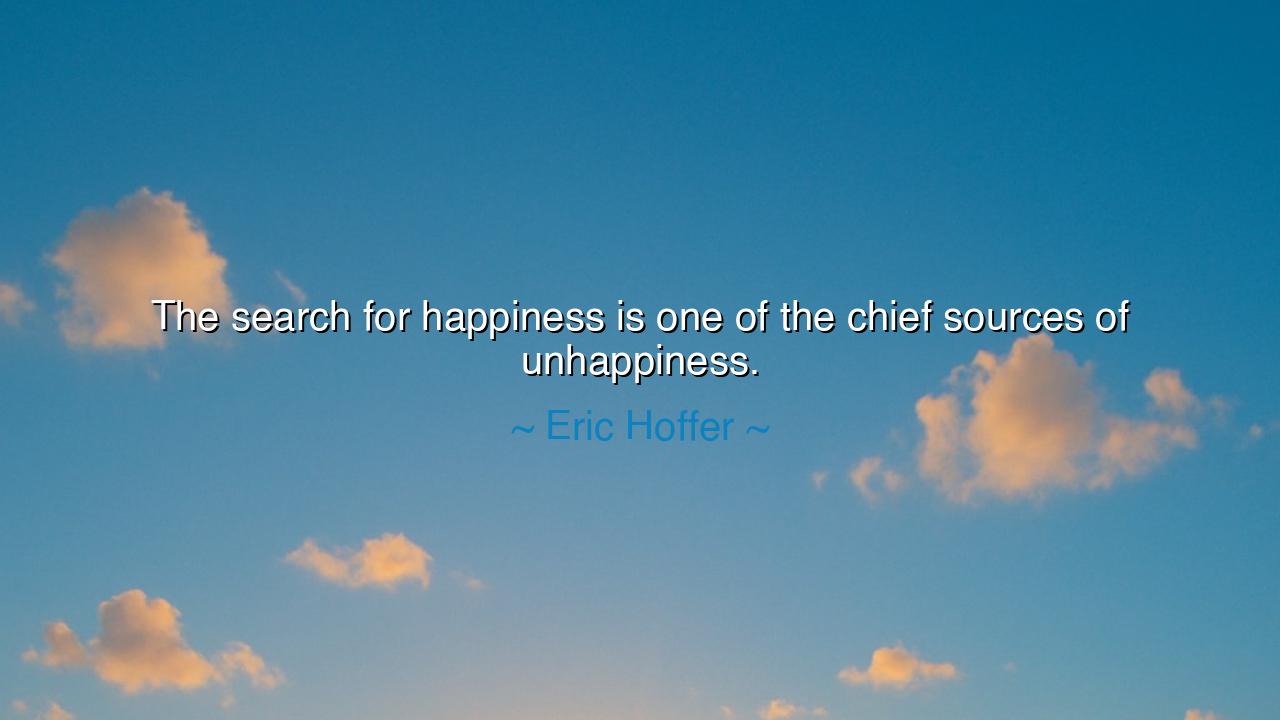
The search for happiness is one of the chief sources of






The philosopher and longshoreman Eric Hoffer, a man who spoke not from ivory towers but from the decks of ships and the depths of human experience, once said, “The search for happiness is one of the chief sources of unhappiness.” In this single sentence lies a paradox as ancient as time itself — that those who chase happiness most desperately are often the ones who never find it. For happiness, like a butterfly, flees from the hand that grasps too hard. It is not won by pursuit, but by presence; not gained through striving, but revealed through stillness, gratitude, and purpose.
Hoffer, born into poverty and blindness, lived a life far removed from the comforts of the philosophers of his age. Yet from hardship, he drew wisdom. When his sight miraculously returned, he saw the world with new eyes — and what he saw was that people everywhere were chasing illusions. They sought happiness in possessions, in status, in pleasure, but the more they pursued it, the emptier they felt. Hoffer understood what the sages of old had long known: that happiness cannot be hunted down, for it is not a thing to be owned, but a state of being that arises when the soul is at peace with itself.
The ancients spoke often of this truth. Lao Tzu said, “If you seek happiness, you will never find it; cease seeking, and it will come of itself.” The Stoics, too, taught that joy flows not from external gain, but from inner harmony — from living in accordance with virtue and reason. Yet mankind, ever restless, forgets this lesson. We build temples to comfort, worship idols of wealth, and race toward every horizon, only to discover that the treasure we seek was buried in our own hearts all along. It is the nature of desire to promise fulfillment and deliver longing. Thus, the more we make happiness a goal, the farther it recedes.
Consider the story of Leo Tolstoy, who in the prime of his fame found himself drowning in despair. He had written great novels, earned the love of the world, and achieved every success a man could dream of. Yet still, he awoke each morning asking himself, “Why live?” His endless search for happiness had brought him only misery. In his later years, he renounced the pursuit of pleasure and turned instead toward simplicity, faith, and service — and it was then, in humility, that he discovered peace. His journey mirrors Hoffer’s truth: when we stop searching for happiness as an end, it quietly returns as a companion.
The reason for this, my child, is that happiness is not a pursuit but a byproduct. It is born of right living — of honesty, gratitude, love, and labor. It blooms when we forget ourselves in the service of something greater. When the artist paints not for fame but for beauty, when the parent gives not for praise but for love, when the worker toils not for riches but for pride in his craft — there, happiness dwells. But the one who lives only to be happy is like a man who drinks salt water; each sip deepens his thirst.
Hoffer’s insight calls us to contentment, to the noble art of being fully alive in the present moment. True happiness is quiet — it lives in small acts: the warmth of sunlight upon the face, the laughter of a friend, the satisfaction of a day’s honest work. It asks nothing extravagant of us, only that we stop running and learn to see what already is. The pursuit of happiness blinds us to its presence, but when we slow down — when we live with awareness and gratitude — joy reveals itself, like dawn breaking over the mountains.
So take this teaching to heart, dear listener: cease the feverish search. Do not measure your days by how happy you feel, but by how sincerely you live. Seek not happiness, but meaning. Live with virtue, purpose, and gratitude, and happiness will follow as a shadow follows the body — quietly, faithfully, without effort. For in the end, as Hoffer and the ancients knew, happiness is not the prize of the seeker, but the reward of the wise — those who have learned that to be at peace with life is the greatest joy of all.






AAdministratorAdministrator
Welcome, honored guests. Please leave a comment, we will respond soon